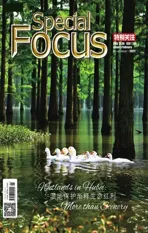“Bird Dad ”Zheng Qingsong
2021-03-22
Edited by He Sai & Bai Ning
Zheng Qingsong is an employee of Huangshi Electric Power Supply Company of the State Grid Corporation of China.He used to be the go-to “nest removal guy”who had to pull down more than ten bird nests on an average day in order to maintain the operation of the power lines.However,he was plagued with guilt over the scenes of homeless birds hovering in the air and squawking after their nests were removed and newborn chicks facing death.Consequently,he started bringing the eggs and chicks home for rescue; he would also rebuild the bird nests on trees nearby or install insulators on the grid tower to protect the nests.He has also destroyed many clapnets laid by poachers and was attacked by them more than once as a result.
Over the past 34 years,he has made himself the guardian of the birds rather than a nestremover.He has converted five bird poachers into fellow bird guardians and now leads a team of bird protectors numbering over 140 members.
郑青松是中国国家电网黄石供电公司职工,他曾是一名专业的“拆巢高手”,为保护供电线路的正常输送,他平均一天要拆十多个鸟巢。然而,每每看到拆巢后无家可归的鸟儿盘旋悲鸣,刚出生的小鸟面临死亡,他心里总悲悯自责。于是,他会将巢中鸟蛋带回家孵化,将刚出壳的小鸟带回家喂养;还会在树杈上为鸟儿安家,在杆塔上为鸟巢装绝缘挡板予以保护;他还反复拆除偷猎者布下的捕鸟网,多次被捕鸟者殴打。
34年来,他不但自己从拆巢人变成护鸟人,还感化5 名偷猎者成为护鸟人,并带出了一支140 多人的护鸟队。
从“拆巢”到“护巢”
郑青松,1970年出生,1987年从技校毕业后,一直在黄石电力系统工作,至今已有34年。起初,郑青松被分配在原黄石供电局线路工区运维班,维护供电线路的安全。他们负责的高压输电线路,大部分杆塔分布在湿地丘陵和高山上,这些杆塔成了鸟儿筑巢栖息的天堂。
大量鸟巢给电力正常输送带来安全隐患,必须拆除。当时年仅17岁的郑青松体力最好,便承担起了这项任务,每天爬上爬下,到几十米高的铁塔上拆鸟巢。
“刚上班那两年,平均每天要拆十多个鸟巢。”郑青松告诉我们。
一开始,郑青松有些恨那些筑巢的鸟儿,后来这种恨渐渐变成了悲悯和同情。
1989年7月的一天,郑青松在拆除一个猫头鹰巢时,发现巢内有4 只雏鹰,亲鸟在空中盘旋、哀号,他和同事们不知道怎么办,把小鸟丢地上,又怕亲鸟一时半会儿找不到合适的地方,于是他与同事们一人一只将雏鹰带回家,买肉喂养。一个多月后,小猫头鹰羽翼丰满,能独立飞行了,他们一起将它们放飞。当几只猫头鹰欢快地飞进林中时,郑青松心里有了一丝成就感。
打那以后,郑青松在拆鸟巢时变得小心翼翼,他不再将其捣毁,而是将整个鸟巢完整地端下来,放在旁边的树杈上固定好。
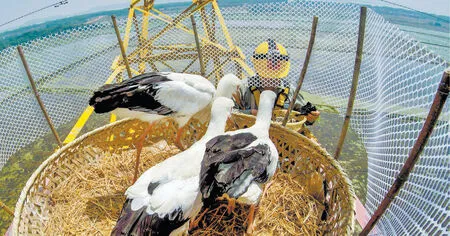
Bird guardians climbing up the tower to feed the chicks 护鸟人员爬上铁塔给鸟儿喂食
From nest remover to nest guardian
Zheng Qingsong,born in 1970,went to work for the Huangshi electric power system 34 years ago,after graduating from technical school in 1987.He was assigned to the power line operation and maintenance team in the former Huangshi Power Supply Bureau,and was responsible for the upkeep of the power lines.Since most of the power poles and pylons are located on wetland hills and mountains,birds naturally flock there to nest and breed.
Bird nests pose serious hazards to power lines and must be removed.As a 17-year-old physically active young boy,Zheng took on this task,scaling the scampering up the heights of the poles to pull down the bird nests on the pylons some hundred feet in the air above.
“During the first two years of work,I removed an average of ten bird nests per day,” Zheng reported.
In the beginning,Zheng hated the birds that built their nests in the “wrong” place,but gradually his hostility gave way to compassion and sympathy.
One day in July 1989,Zheng found four owlets in a nest he was about to pull down,while the parent owls were hovering and crying out in the air above.He and his colleagues didn’t know what to do.If they had left the owlets on the ground,the parents might not be able to find a suitable place for their family.In the end,he and his colleagues each took one owlet home and fed them.A month later,when the little owls had grown out of the owlet stage and were able to fly,they released them back to nature.Seeing the young owls flying cheerily into the forest,Zheng felt happy and accomplished.
在一次巡查线路时,郑青松发现一只喜鹊被电死在地上,而铁塔上的窝内,有两只刚破壳的小鸟和三只鸟蛋。“亲鸟死了,两只小鸟肯定活不了。”郑青松再次将小鸟和鸟蛋都带回了家,买面包虫精心喂养,并用一只纸箱垫上布条做成简易的孵化箱,用灯泡对鸟蛋进行孵化。
虽然,几只鸟蛋最终没能孵化出小鸟,但两只小喜鹊在郑青松的精心照料下,转眼能独自飞行和觅食了。放飞时,两只喜鹊唧唧喳喳围着他盘旋,久久不愿离去。
多次被盗猎者殴打
干了两年拆鸟巢工作后,郑青松多了一份业余工作——保护鸟儿。
在他负责的区域内,湿地食物丰富,丘陵和高山则是鸟儿筑巢栖息的理想去处。那时候,盗猎现象非常猖獗,郑青松决心用自己微薄之力保护自己路线上的鸟儿。为了掌握不同鸟儿的习性,他空余时间经常泡在图书馆,阅读鸟类知识,了解鸟儿的生活习性。
每次巡线时,看到林中的捕鸟网,郑青松都会收起并烧毁。这惹怒了盗猎者,对方发现毁他们网的竟是一个电工,纷纷拳脚相向。最严重的一次,郑青松被三名盗猎者围殴,浑身多处软组织受伤,几天下不了地。
同事徐济红,是从捕鸟人转变过来的护线员。他至今还记得当年与郑青松发生冲突的情景,坦言曾带人打过郑青松两次。
“这都是23年前的事了。”徐济红说,那时他没有正式工作,靠捕鸟和捕鱼赚些生活费。在几次发现自己安装的捕鸟网被毁后,心疼不已,他蹲守在山林中等待毁网人。当发现毁网人穿的是电工服而非森林公安制服时,顿时恼怒不已,悄悄叫了几人将郑青松狠狠揍了一顿。
郑青松并没因此放弃,徐济红认为他“死性不改”,在自己的最后一张网被拆除后,又带人将他打了一顿。这一次,挨了打的郑青松却找上门来了。当徐济红看到郑青松出现在自己家门口时,心中忐忑不安,没想到对方却和他拉起了家常。在了解到徐济红家庭情况后,郑青松有了自己的打算,回到单位向领导汇报,将徐济红招为护线员,解决了他的家庭困难。
“像我这种情况的还有4 个人,后来我们护线时,发现捕鸟网都会主动上前拆除。”徐济红说,时间久了,他们也对鸟儿慢慢有了感情。在郑青松的熏陶下,他们由盗猎者变成了护鸟人。
从一个“鸟爸”到一群“鸟爸”
二十多年如一日,郑青松一边巡线一边护鸟。在他的带动下,越来越多的人加入他的护鸟行列。
“刚开始以为是郑班长的个人爱好,后来才知道他是为了保护鸟儿。”同事胡胜介绍。一起巡线时,他发现班长总会把亲鸟被电死的幼鸟带回家喂养。有时在铁塔上的鸟巢中发现幼鸟,郑青松并不将其拆除,而是给鸟巢加上绝缘挡板,将它保护起来。
胡胜说,在郑青松影响下,他们班组都像照顾自己孩子一般,保护着鸟儿。郑青松也被称为“电网鸟爸”。
郑青松的做法得到了所在单位的认可,并给予其大力支持。在郑青松的带动下,公司2016年成立了“电网鸟爸”党员服务队,郑青松任队长,首批20 人加入到了服务队中。
“目前有140 多人加入护鸟队伍中来了。”郑青松透露,该公司90 余名一线职工和护线员,全都是爱鸟护鸟宣传员,同时还有50 多名各行业志愿者加入。
目前,只要鸟巢没有影响线路的安全,他们原则上只装绝缘挡板,不拆鸟巢。对那些已经危及线路安全运行的鸟巢,或者有鸟蛋、幼鸟的鸟巢,就转移到不影响线路安全的电塔部位,或者小心取下来放到电塔附近稳固的树杈并密切监视,想方设法让每一颗鸟蛋孵化、每一只幼鸟安全活下来。
From then on,Zheng exercised extreme caution while removing the bird nests.Instead of destroying them,he would take the entire nest down and fix it on the tree branches nearby.
While performing a wire inspection,Zheng found an electrocuted magpie on the ground and two newly hatched chicks as well as three eggs in the nest on the pylon.“With the mother bird dead,the two little chicks had no means to survive.” Zheng brought the birds and eggs home.He bought mealworms to feed the chicks and made a simple incubator to hatch the eggs with a cardboard box cushioned with cloth and light bulbs above.
The eggs never hatched.Yet the two chicks grew up healthy and independent under Zheng’s meticulous care.When they were released,the two little magpieshovered over his head for a long while,chirping and reluctant to leave.
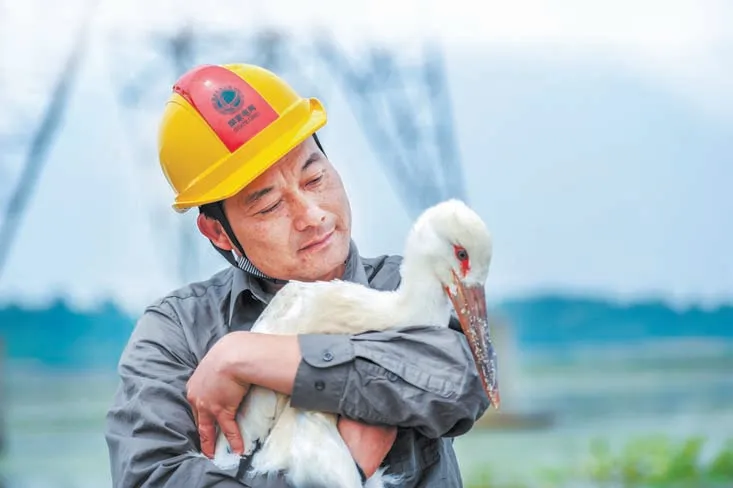
Zheng Qingsong and the oriental white stork he rescued 郑青松和他救下的东方白鹳
Poacher attacks
After two years of nest-removing,Zheng got himself a new job,that of bird guardian.
The sprawling wetlands teeming with life in his work area had a great abundance of food resources while hills and mountains are perfect places for birds to nest and breed,which is why poaching was rampant back then.Zheng determined to try his very best to protect the birds along his work route.He stayed long in the library in his spare time to read books about birds and learn about different birds’ habits.
While patrolling the power lines in his area,whenever he saw a trammel in the forest,Zheng would remove and burn it,infuriating the poachers who would beat him when they found out that it was an electrician that had destroyed their nets.In the most serious case,Zheng was beaten up by three poachers,which caused him multiple soft tissue injuries,leaving him bedridden for days on end.
Xu Jihong,his colleague,had been a poacher before becoming a lineman.He still remembered his conflict with Zheng that year,and frankly confessed that he had beaten Zheng twice.
“That was 23 years ago,” Xu said.He had been unemployed and scraping out a meager existence by catching birds and fish.Naturally,he was distressed after his bird net was destroyed on multiple occasions.He kept watch for a couple of days in the forests and found out that the net destroyer was an electrician instead of a forest ranger.He was angry and called on a few fellows to beat Zheng up.
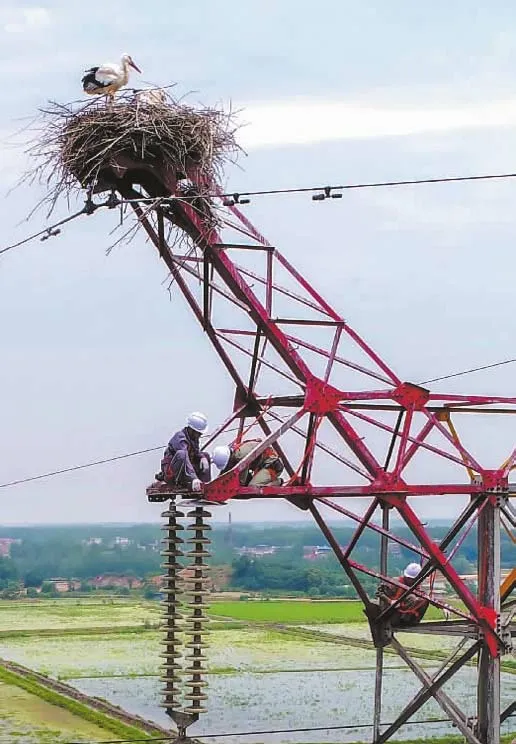
Installing insulators on the pylon to protect the bird nest给铁塔上的鸟巢装绝缘挡板
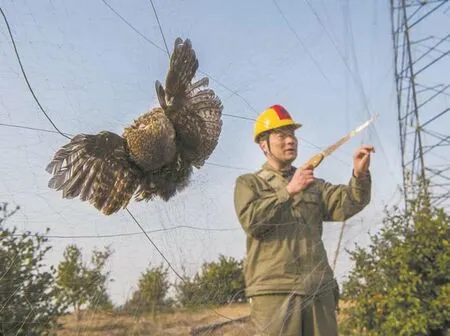
Zheng Qingsong cutting the clapnet put up by poachers郑青松在切割偷猎者安装的捕鸟网
为东方白鹳更改施工设计
几十年来,郑青松自己也不清楚救助了多少只鸟,拆了多少只捕鸟网。他的手机屏保是一张漂亮的翠鸟图片。这是有一次护线时,发现一只倒在路边的翠鸟,他怀疑是中毒,并把它带回家施救,未能救活,郑青松深感遗憾,从此便将手机屏保换了这张翠鸟图片。
2016年4月,服务队在巡查时,发现一座杆塔上的鸟巢被施工人员误拆下来,里面有三只幼鸟,吭吭叽叽。郑青松给它们再造了一个家,后来才知道这是世界仅存约3000只的珍稀动物东方白鹳。
后来,动物保护专家建议还是要将巢转移到杆塔上,东方白鹳亲鸟才会感到安全,于是,他们把巢移到了54 米高的杆塔高处,并轮班喂养幼鸟50 多天,直到三只东方白鹳重返大自然。
2020年6月,为了配合203省道建设,最初的设计方案要求将56 号铁塔移位。由于塔内东方白鹳正在孵着幼鸟,为了不惊扰到它们,供电公司向设计方提出,避开56 号铁塔。“为了给鸟儿让道,我们更改了施工方案,这是很罕见的。” 黄石供电公司输电运检分公司党总支书记詹时斌说,“如果不出意外,今年它们还会飞来筑巢孵鸟。”
连绵不绝的绿水青山、跨越山川的道道银线、展翅高飞的成群鸟儿……看着这样美丽和谐的山水田园,“鸟爸”郑青松十分欣慰。
不久前,郑青松被选入了2020年11月“中国好人榜”。

Bird guardians and their avian compadres 护鸟队和鸟儿交上朋友
Yet Zheng did not give in and destroyed Xu’s last trammel.Upon seeing this the latter believed Zheng should be taught one more lesson and had people beat him up again.Yet Zheng took a curious course of action,showing up at a shocked and embarrassed Xu’s doorstep one day out of the blue.Instead of meting out violent vengeance,Zheng just struck up a conversation with Xu,exchanging pleasantries and chatting about daily life.Upon learning about Xu’s plight and financial hardship,Zheng laid out a plan.He went back to his company and asked his superiors to recruit Xu as a lineman,effectively solving his financial difficulties.
“There were four other persons in a similar situation as me.Later,when we examined the power lines,we would remove clapnets wherever we found them,” Xu said that over time,they gradually developed compassion and sympathy towards the birds.Under Zheng’s influence,they were transformed from bird poachers to bird protectors.
From bird dad to bird dads
For more than 20 years,Zheng patrolled the power lines and protected the birds.People began rallying to his cause and joining his team in increasing numbers,citing Zheng as their inspiration and guiding light.
“At first I thought it was just Captain Zheng’s hobby,later I learned that he was doing it all for the good of the birds,” stated Hu Sheng,a colleague of Zheng’s.Whenever they came across chicks who had lost their parents to electric shock in their patrols,Hu noticed Captain Zheng always bringing the chicks home and taking care of them.For some bird nests on the pylons,instead of removing them,Zheng would install insulators to protect them.Hu Sheng stated,under Captain Zheng’s influence,their whole team started getting in on the avian protection game.Hence Zheng’s reputation as “the bird dad on the power grid.”
Zheng’s practice was approved and supported by his company,which founded a service team with the moniker “Bird Dads on the Power Grid” in 2016.Zheng was the acting captain initially in command of a 20-member crew.
“So far,more than 140 people have joined our avian protection team,” Zheng Qingsong said.His company has more than 90 frontline employees and linemen,all of whom are enthusiastic birdprotection promoters.In addition,there are more than 50 volunteers from various industries who have taken up Zheng’s cause.
For bird nests that do not interfere with power lines,Zheng and his team install insulators instead of removing the nests.Nests that do pose hazards to the safe operation of the power lines or nests with eggs and chicks are relocated to pylons clear of the lines,or onto strong tree branches nearby and monitored closely thereafter,in a concerted effort to help every bird egg hatch and every young hatchling survive.
Construction design modified for oriental white storks
Zheng Qingsong has never stopped to count how many birds he has rescued and how many clapnets he has removed over the past few decades.The screen saver on his cell phone is a beautiful kingfisher.On one occasion at work,he found a kingfisher lying on the side of the road.He suspected food poison and took it home in a valiant attempt to pluck it out of the jaws of death,but he ultimately failed.He deeply regretted it and set the picture of a kingfisher as his screen saver.
In April 2016,the service team came across a bird nest accidentally removed from a pylon by construction workers,in which three chicks were chirping and chattering helplessly.Zheng rebuilt a home for them,and later learned that they were one of the rarest birds in the world,the endangered oriental white stork,whose number left was only about 3,000.
Later on,animal experts suggested that the nest be put back on a pylon so that the parent birds would feel safe.They put the nest back onto a 54-meter-high tower and took turns feeding the young birds for more than 50 days,until the three grown-up oriental white storks returned to nature.
In June 2020,the original construction plan of Provincial Highway 203 called for the removal of pylon No.56,on which an oriental white stork family was raising their young.As a result,the power supply company proposed to the designer to go around pylon No.56 instead of removing it to protect the birds.
“We changed the construction plan to make way for the birds,which just doesn’t happen every day,” said Zhan Shibin,the Party Secretary of the Transmission and Inspection Branch of Huangshi Electric Power Supply Company.“If all goes well,the birds will come back next year to nest and breed again.”
Vistas of babbling waters and verdant hills,with the glint of silver power lines cutting their way through mountains and next to translucent rivers,and flocks of birds soaring high overhead...such a beautiful and serene landscape warms Zheng’s big heart.
Not long ago,Zheng was elected to the “China Honor Roll”—a prestigious list populated by individuals of exceedingly high character—in November 2020.Animal lovers and bird watchers alike rejoice.
